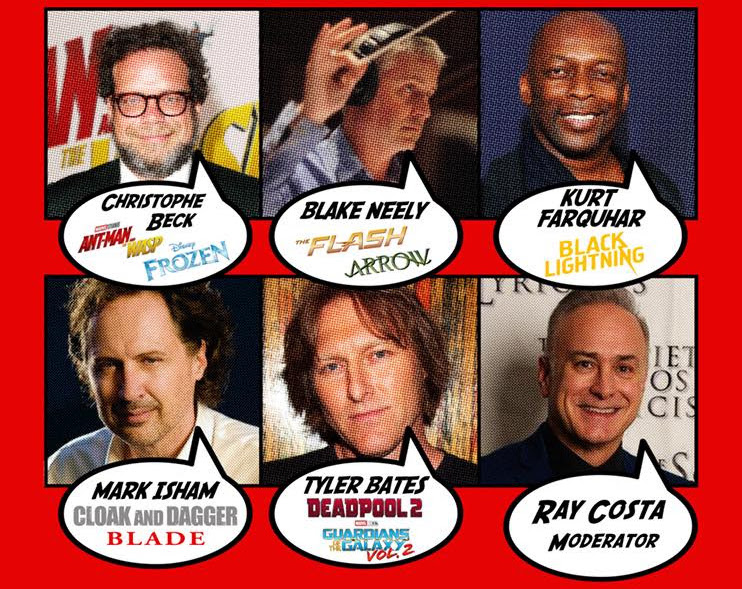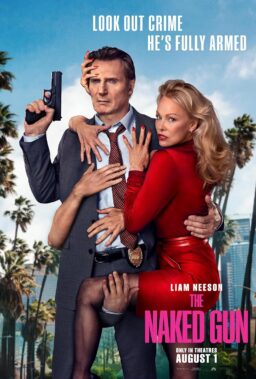It isn’t the costumes or the hours of waiting in line to see movie stars that define San Diego Comic-Con; it is the fans who are so passionate that they cheer for below-the-line talent with as much enthusiasm as they do for the actors who play The Avengers. The sixth annual presentation by the composers who score superhero movies and television shows was one of the first panels at SDCC this year, and the packed room cheered as the men came on stage. (Moderator Ray Costa responded to last year’s question about women composers by telling the crowd that wanted to include Pinar Toprak, but she is working on the score for “Captain Marvel.”)
Each of the composers talked about what they do to keep the music vibrant and exciting but always in support of the action and the storyline. Kurt Farquhar, who toured as a jazz musician in his 20’s and turned to writing scores only after he became homeless, has provided the music for nine series, including “Black Lightning.” “I wanted some interesting sounds to make you aware it is an African-American cast,” he said. “Not by putting a beat and going straight-up hip-hop, but there is a hip-hop beat under it, with the lower bass on drum and violins doing the top part. So it feels kind of urban without using urban sounds.” He called scoring “dancing with dialogue.”
Blake Neely was the acknowledged MVP of the group, providing scores for almost all of the DC universe television series as well as shows like “Riverdale” and “Blindspot.” A highlight for him was the four-series Arrowverse crossover episode “Crisis on Earth X,” which gave him a chance to blend together the individual themes, each designed to be distinctive but compatible. “We had to have an orchestra for that,” he said, then laughed, “just to make it even harder for us to get it done in a week.” La-La Land Records has released the score of that show, with proceeds going to the United Way Fund for those affected by the fires in California. He said that when he composes, “I get into the characters like an actor. Am I feeling Arrow today, or Supergirl?” What we do is “bring the scene to life.”
Mark Isham is one of the most prolific composers in Hollywood, working in film and on television. He spoke about creating something outside the usual superhero musical vocabulary for “Cloak & Dagger,” because it is about two teenagers who for much of the first season do not really understand that they have superpowers. “They’re trying to figure it out. The show is really an allegory for teenage angst and discovering themselves. There’s a great reliance on ways to keep the teenage world alive.” So, he wanted to create something “emotional, atmospheric.” The show includes surreal touches, with scenes portraying fantasy and subconscious elements, which require “a different texture. Although,” he continued, “what we’re showing you is an action sequence.”
The “Guardians of the Galaxy” movies are known for their ’70s mixtape soundtracks and slightly snarky tone, which was a challenge for composer Tyler Bates. “I’m known as dark, but [director] James Gunn wanted tuneful melodies repeated in different moods.” He showed one very emotional scene from the second film and told us that one of the movie’s most significant digital effects was erasing the earbuds the actors were wearing so they could hear the score playing as they performed, “to integrate the musical language.” Like the other composers, he has to coordinate with the sound effects, which can include “every sound that cancels out music.” On one of his shows, “The Punisher,” the character plays guitar, which provides another opportunity to support the story.
Christophe Beck composed the music for the “Ant-Man” movies, matching the tone of the movie’s visuals and storyline. “It had to be quirky and off-beat but still making sure it was in the Marvel universe.” He explained that most popular music is in four beats to the bar, but he created this score in 7/8. “There’s like an extra beat in every bar.” For the Wasp character, he did five beats to the bar “to give her forward movement and great energy.” He found himself creating “a darker version of the theme” that was not right for the film but matched the end credit sequence.
Farquhar gave the best summary of what they do and why they do it: “You do this because it fills your heart and fills your soul. And you want to let it out and fill the hearts and souls of the people who watch and listen.”












